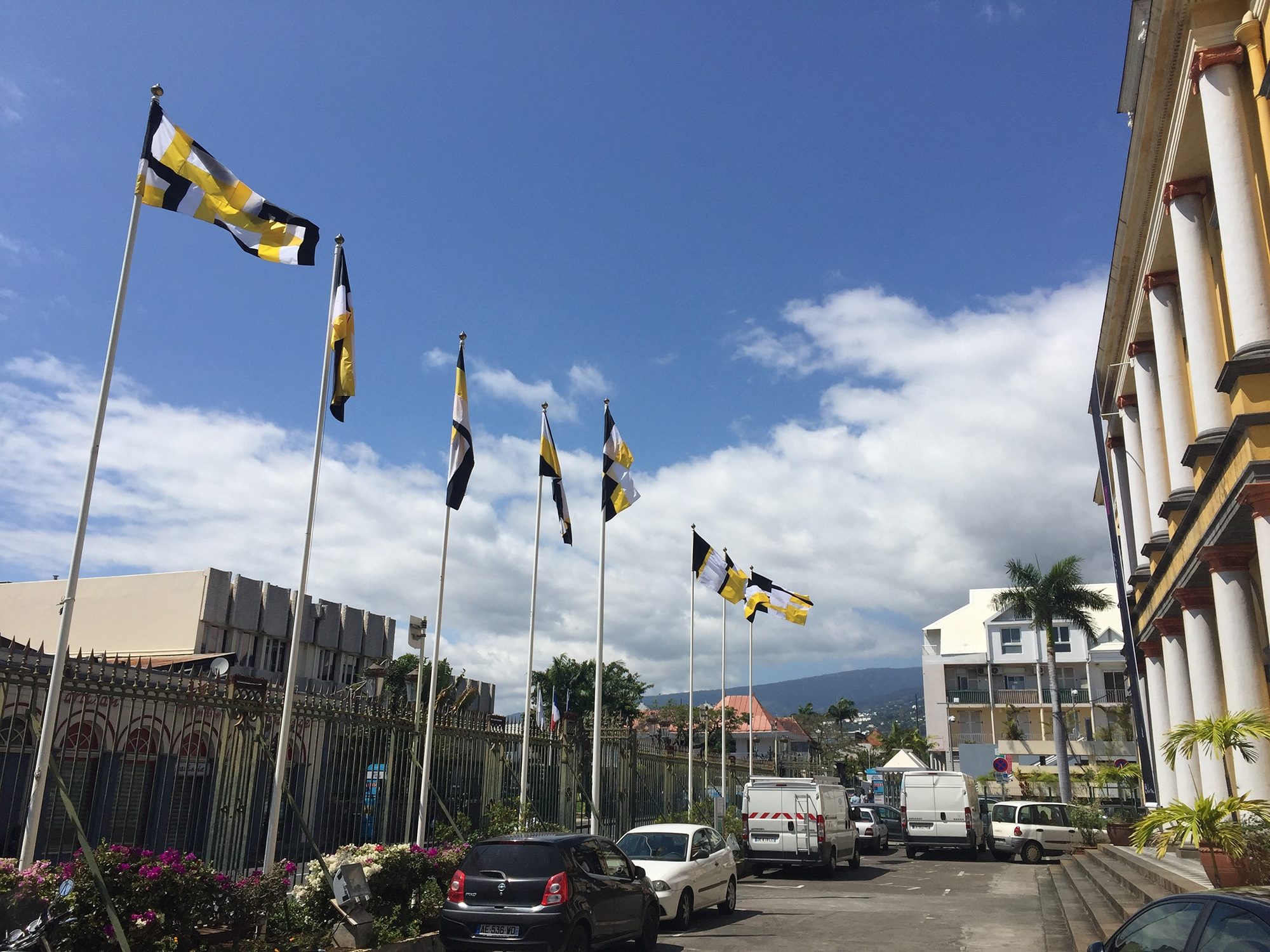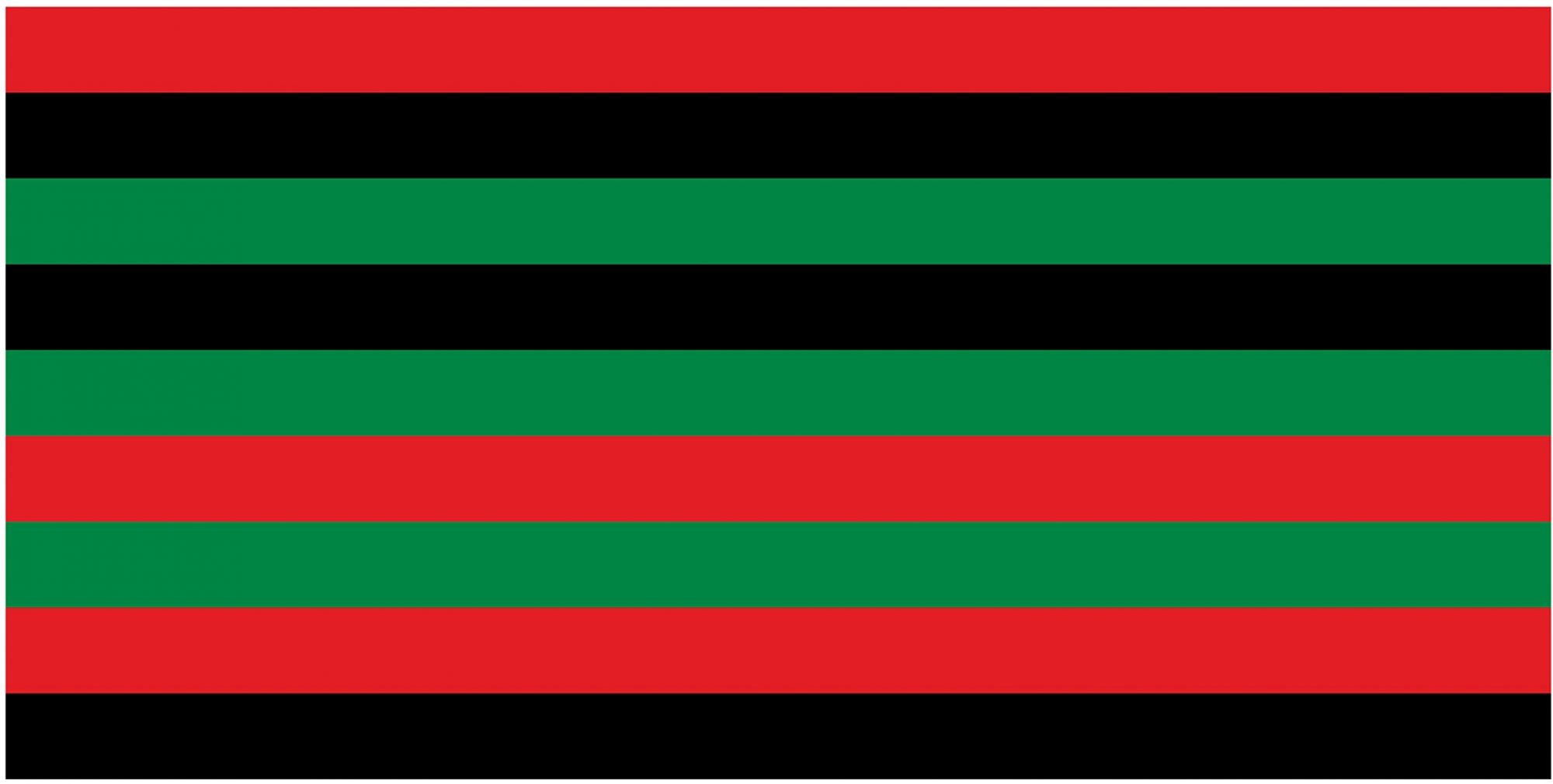Raimi Gbadamosi is an artist, writer and curator. His work deals with the tri-part relationship of race, power, and language through games and play, exchange or encounter.
In 2000, Gbadamosi created The Republic, a state without borders, whose citizens choose themselves and whose territory is defined by where the flag is flown. He says, ‘the flag acts as a rallying symbol and declares spaces where it’s flown independent’.
In this essay, Gbadamosi describes experiences and associations with flags; whether wrapped, draped or flown, they signal both belonging and rejection. When there isn’t one representing me, he asks, is it time to plant a new flag and claim a new cultural space?
Hold Me

Raimi Gbadamosi: Patrimony, Reunion Island 2015
Fatherland is too aggressive, visions of war and death loom at its invocation, Homeland is excessively inclusive and too open for some, so Motherland takes precedence, promising warmth while disguising the possessive sentiment inherent in the un-naming of the nation. This Motherland is codified into a reproducible emblem, at the ready when need may arise to allay domestic or foreign land-identity-sickness. The flag provides a protective comfort blanket that wraps the motherland’s child in love, love codified before national awareness affords the blanket, jingoistic recognition.
The blanket remains constant enough to remind ‘the people’ what embracing love should feel like in times of doubtful need. Except, as the expression goes, some are born on the wrong side of the blanket, and laying under this blanket causes pain, rather than comfort, causes undoing rather than protection. For those of us constantly reminded of our place in the land, the flag is hard to rest under. It is being able to take the flag’s dependability for granted that allows allegiance, to really see the flag, will make demands of its promise. Just as having to earns a mother’s love disturbs its scope, limits trust, disturbs ease, questions the blanket’s intention: motherer or smotherer.
As a comfort blanket, it drapes the coffins of those deemed worthy of the state’s recognition, especially when the state seeks to celebrate death in its own name. The draping marks a disembodied nation expressing pseudo-religious love into the grave. Yet the flag does not follow the dead into the land, sea, or crematorium, there are limits to its reach, the symbol of love remains with the living to reinforce the nation’s doting, to remind observers of who truly cares for them enough to linger after death. And flags on masts drop their heads in sorrow, daring any other emotion to defy national intention.
Anyone who has seen Riefenstahl's flag and banner fest will understand the nervousness governments instil when they demand reverence and mass display of their flag, and retorts that the flag is but a flag, undermines arguments of ignorance of demanded obeisance, the state proffers in its moment of violent banality.
The covering covers a multitude

Raimi Gbadamosi: Campaign Flag of G.R.O.I.N. (Get Rid Of Immigrants Now), 2016
However, to note those who truly die in the name of the flag, is to accept it is simply not those deemed worthy of flag-draped coffins, for they have already accepted the flag’s dominance. It is the many who are killed in the name of making and preserving the nation in its magnitude. It is bodies that fall violently, silently, in plain sight of those that deem consequential death unequal. It is the savage, the outlander, the unarmed, those whose humanity is rendered questionable unto death. Acknowledging all death taints the flag’s purity of mission. Akin to Robinson Crusoe’s aura, it is expedient to ignore why he went to sea, that he carried on his slave-making ways, better to focus on his ability to survive and tame his island refuge, and plant his flag. When, at long last, those flag-making dead are brought forth for collective reckoning, they are worth only compensation, never ceremony, and definitely not flag-draping, Motherlands cannot warm the bones of the ostracised dead.
Reminiscence

Ensigns (2013) by Raimi Gbadamosi (hanging from ceiling) and part of Bacchus and Ariadne (2004) by Kimathi Donkor (on right-hand wall, front) at The Collection Museum, Lincoln.
The young Black man saluting the French flag made memorable by Roland Barthes; Linford Christie, post-race, draped in the Union flag; Donald Trump awkwardly hugging the American flag; the first of October 1960’s Nigerian flag being raised to the British flag lowering in midnight darkness rendering the embarrassing transition moment invisible; the many versions of protestors burning flags that simply reinforces the protested nation’s powers.
And the visceral feelings of rejection when encountering English flags hanging from domestic balconies or obscuring windows that I ought to be able to identify with, declarations of alienating allegiance to an exclusionary ideal. Flag fliers making personal statements to me, signalling my lack of welcome in what they deem their country, daring me on claims of blood kinship. I strive to understand the need to announce their belonging. I do this while accepting that I fly flags too, even if for different reasons, a flag is a flag.
I recall the first time I publicly unfurled The Flag of The Republic, I was asked what I was doing to the British flag. I should have been pleased that my goal was met, questioning the established order, raising a flag able to say something about me, questioning the flag that assumed it could represent me.
If only flags could remain innocent of the human desire for domination they represent. I have seen my flags inside and outside buildings and I have a deep sense of ownership. When a viewer looks up to my flags, my personal politics of presence is never far from my consciousness. Flags are pleasing to see, are alive in the wind, instinctively follow good design concerns, and provide me with a language.

Raimi Gbadamosi: Flag of The Republic
A Joke
A flagbearer walks into a shop and says ‘now that I have found it, I claim this shop, and all that it contains in the name of the flag I carry, I plant my flag and seed the shop with my essence’. The flagbearer knowing the flag’s role in the nation’s collective identity, enacts their dominating fantasy in the name of their flag. The flagbearer knows the nation will not reject their claim, if they do, they reject their own selves in the flag. Now that the flag owns the shop, the flagbearer can kill in the name of the flag to possess the shop [possession being nine-tenths of the law], and the flagbearer has the will to kill for the flag to possess the shop. The flagbearer cannot allow flag failure as this will make justifying the flag’s avarice harder each time. Songs will be written about how the flag persevered over the shop-owner who dared to question the right of the flag to own all it claims. Anything that happens is merely the flag being defended, the flagbearer seeks nothing. Flag-questioners will have to understand the depth of flag-rights. As might is right, and flag has might, then flag is right. And the flagbearer can walk into a shop and claim it in the name of the flag.
I Need a Flag
Doing some work with Kimathi Donkor at home, the Mighty Diamonds I Need a Roof repeatedly came through the laptop, after so many repetitions, Kimathi looked at me, and asked “Can we listen to something else?” we both laughed, we both liked the song, we both agreed with the song, but we needed something else, we needed a new song.
The flags I make are attempts at a new song, a claim for space in a cultural landscape that forces me to question what can represent me. So, to paraphrase a moment I can now not forget:
I need a flag flying over my head
I need a flag flying over my head
And recognition at the table
And recognition at the table
This pain in my heart
It's not for everyone

Raimi Gbadamosi: The Future Will Be Pax Africana, 2017
©Raimi Gbadamosi 2021
©RGb May 2021
raimigbadamosi.net
